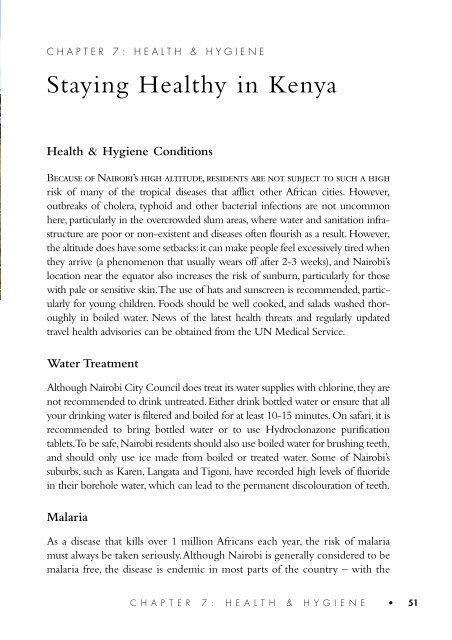KARIBU KENYA - UNON - the United Nations Office at Nairobi
KARIBU KENYA - UNON - the United Nations Office at Nairobi
KARIBU KENYA - UNON - the United Nations Office at Nairobi
You also want an ePaper? Increase the reach of your titles
YUMPU automatically turns print PDFs into web optimized ePapers that Google loves.
CHAPTER 7: HEALTH & HYGIENE<br />
Staying Healthy in Kenya<br />
Health & Hygiene Conditions<br />
Because of <strong>Nairobi</strong>’s high altitude, residents are not subject to such a high<br />
risk of many of <strong>the</strong> tropical diseases th<strong>at</strong> afflict o<strong>the</strong>r African cities. However,<br />
outbreaks of cholera, typhoid and o<strong>the</strong>r bacterial infections are not uncommon<br />
here, particularly in <strong>the</strong> overcrowded slum areas, where w<strong>at</strong>er and sanit<strong>at</strong>ion infrastructure<br />
are poor or non-existent and diseases often flourish as a result. However,<br />
<strong>the</strong> altitude does have some setbacks:it can make people feel excessively tired when<br />
<strong>the</strong>y arrive (a phenomenon th<strong>at</strong> usually wears off after 2-3 weeks), and <strong>Nairobi</strong>’s<br />
loc<strong>at</strong>ion near <strong>the</strong> equ<strong>at</strong>or also increases <strong>the</strong> risk of sunburn, particularly for those<br />
with pale or sensitive skin.The use of h<strong>at</strong>s and sunscreen is recommended, particularly<br />
for young children. Foods should be well cooked, and salads washed thoroughly<br />
in boiled w<strong>at</strong>er. News of <strong>the</strong> l<strong>at</strong>est health thre<strong>at</strong>s and regularly upd<strong>at</strong>ed<br />
travel health advisories can be obtained from <strong>the</strong> UN Medical Service.<br />
W<strong>at</strong>er Tre<strong>at</strong>ment<br />
Although <strong>Nairobi</strong> City Council does tre<strong>at</strong> its w<strong>at</strong>er supplies with chlorine,<strong>the</strong>y are<br />
not recommended to drink untre<strong>at</strong>ed. Ei<strong>the</strong>r drink bottled w<strong>at</strong>er or ensure th<strong>at</strong> all<br />
your drinking w<strong>at</strong>er is filtered and boiled for <strong>at</strong> least 10-15 minutes. On safari, it is<br />
recommended to bring bottled w<strong>at</strong>er or to use Hydroclonazone purific<strong>at</strong>ion<br />
tablets.To be safe,<strong>Nairobi</strong> residents should also use boiled w<strong>at</strong>er for brushing teeth,<br />
and should only use ice made from boiled or tre<strong>at</strong>ed w<strong>at</strong>er. Some of <strong>Nairobi</strong>’s<br />
suburbs, such as Karen, Lang<strong>at</strong>a and Tigoni, have recorded high levels of fluoride<br />
in <strong>the</strong>ir borehole w<strong>at</strong>er, which can lead to <strong>the</strong> permanent discolour<strong>at</strong>ion of teeth.<br />
Malaria<br />
As a disease th<strong>at</strong> kills over 1 million Africans each year, <strong>the</strong> risk of malaria<br />
must always be taken seriously.Although <strong>Nairobi</strong> is generally considered to be<br />
malaria free, <strong>the</strong> disease is endemic in most parts of <strong>the</strong> country – with <strong>the</strong><br />
CHAPTER 7: HEALTH & HYGIENE • 51


